Mid90s is the directorial debut of Jonah Hill, starring Sunny Suljic as a young teen who begins to hang out with a group of older skateboarders in 1990’s Los Angeles. Lucas Hedges and Katherine Waterston co-star as his older brother and mother, respectively. It’s a coming-of-age tale full of adventure, intrigue, and of course nostalgia. How does Hill’s first foray behind the camera pan out? *SPOILERS AHEAD!*
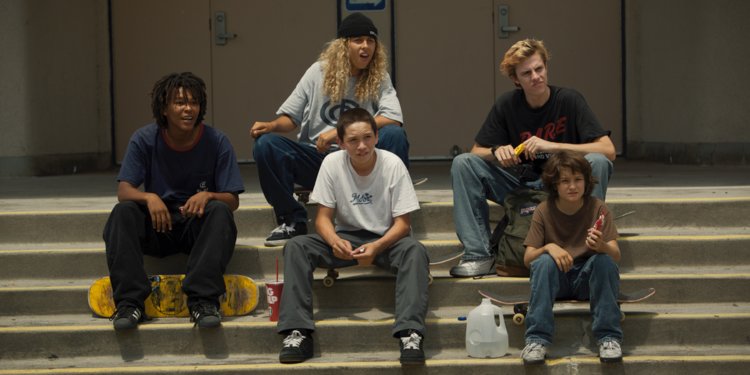
Even though Jonah Hill has never made a movie before, I had faith going into Mid90s that he understood how to develop characters and deliver powerful emotional experiences thanks to his background in both comedy and drama. There’s only so much hanging around the likes of Judd Apatow and Martin Scorcese you can do without picking up on some things yourself. I had the same instinct with Bo Burnham for his debut Eighth Grade: performers who are well-versed in comedy generally have a good understanding of what makes characters tick. Sure, maybe their macro-plot construction won’t be perfect, but they will understand how to get the minutia right. And boy, does Hill get it right here.
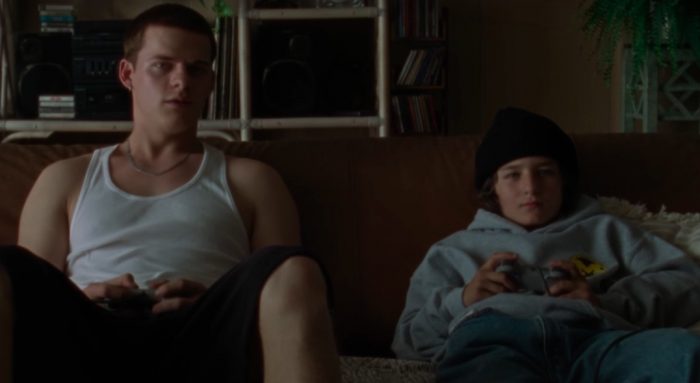
Mid90s tells the story of Stevie, a 13-year-old with a mostly-absent single mother and an abusive older brother Ian. From the beginning, it is established that Stevie is someone fascinated by status symbols. He sneaks into his brother’s room often to admire his vast collection of cassette tapes, posters, and other materialistic possessions. I appreciate this early characterization because, not only can the audience relate to this young kid snooping in his older bro’s room, but it’s a nonverbal way to clue us in to Stevie’s motivations before we’ve seen him take a single meaningful action. I felt like I had a good understanding of Stevie within the first ten minutes or so, which freed me up to root for his success in the coming social maneuverings he makes.
Soon we’re introduced to the skate crew: Ray, who has ambitions of going pro; Fuckshit, who is mostly in it for the laughs and good times; Fourth Grade, the dim-witted videographer with dreams of becoming a filmmaker; and Ruben, a youngster like Stevie with serious little-man syndrome. Easily the best part of the film is Stevie’s interactions with the group, as every character felt well-developed and played well off of one another. There is a lot of hidden tension within the group: you have Ray and Fuckshit at odds over a lifelong friendship being tested by shifting aspirations; Reuben and Stevie clashing over who the bottom dog of the pack is; Fuckshit and Stevie over how influential the wild one is over the impressionable youngster. I could have watched another half-hour at least of just these characters hanging out and shooting the shit. It makes sense that Hill would excel in these moments as well: his ability to craft humorous and heartwarming moments out of thin air and make them seem spontaneous is the mark of an expert comedian.
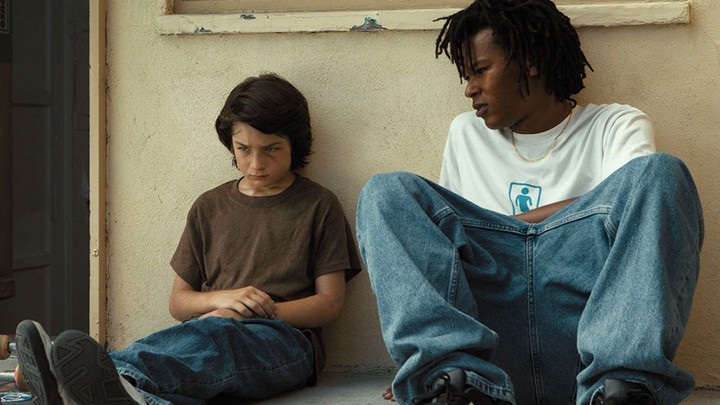
Helping the cause greatly is the phenomenal acting by all the youngsters in the film. Hill selected actual skaters to portray the main crew, most of whom had never acted in anything before. It definitely helped for the skating portions, but they were all surprisingly great in the quieter moments as well. Sunny Suljic has an innate understanding of how to use body language and facial expressions to convey emotion and intent, able to switch between innocent little kid and hardened faux-thug with ease. Na-kel Smith as Ray was also superb, giving me one of my favorite mentor figures in a coming-of-age story that I’ve seen in ages. Even the unique way he spoke was compelling, perfectly capturing the phenomenon of a wise old soul inhabiting the body of a still-developing youngster learning how to express himself. Also of note, Lucas Hedges was almost unrecognizable as Ian, shedding his typical preppy persona in favor of a mentally-stunted bully, and he was perhaps better than I’ve ever seen him on screen.
Hill’s visual eye is actually pretty strong, and he understands the value of a simple reaction shot to set the scene. Something as innocuous as a wide grin from Stevie when Ray asks him to fill up the water jug, or a genuine reaction to successfully landing his first ollie, just warms the soul. Hill uses a throwback 4:3 aspect ratio to give the film a feel of a 90’s VHS recording, which is quite apt and added to the experience. There are a few dazzling sequences, such as the recurring downhill skate slope as cars whiz by or a sweeping long take through a high school party. There are some moments that I thought could be tightened up: Hill likes to use slow pans between characters, some of which worked, others of which ground the pacing of a scene to a halt with unnecessary empty frames. Some scenes also linger longer than necessary, and despite the short runtime, I did find myself bored once or twice waiting for something new to happen.
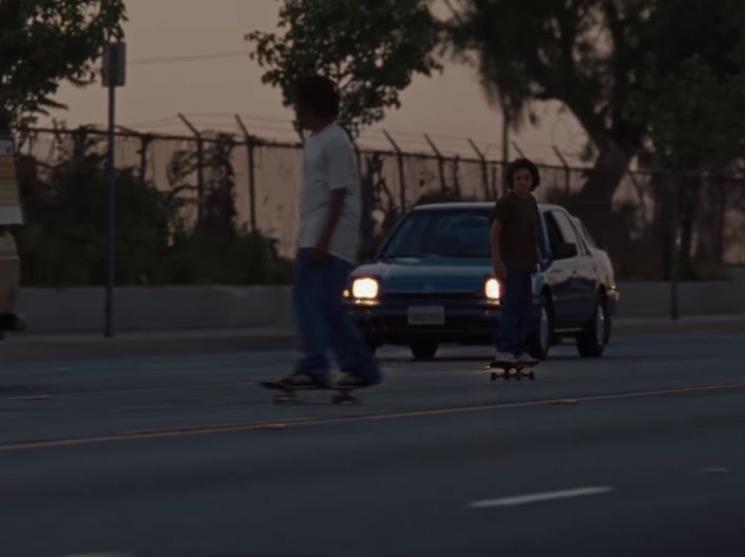
The soundtrack for the film was excellent. I had no idea that Trent Reznor and Atticus Ross scored the film until the opening credits, but they turn in their best work since The Social Network and I hope it nets them another Oscar nomination (even though we all know who’s going to win that award). Hill’s passion for 90’s hip hop shines through here with an eclectic mix of songs from artists like 2Pac, The Notorious B.I.G., A Tribe Called Quest, N.W.A. and many more. The best way to describe the mood of the film is “cool,” with the music helping to underscore this theme of characters trying their hardest to fit in with the in-group and appear tough.
I also enjoyed the sound design of the film, oddly enough; Hill apparently gets around budgetary restraints through implication and audio cues alone, and it works beautifully. One scene sees Stevie fall from a roof, and a simple hard-cut and brutal sound effect does more to draw a reaction than any carefully-choreographed stunt could have. The car crash scene is similarly impressive using the less-is-more philosophy, as a jarring sound and clever lighting technique substitutes nicely for an actual crash and arguably works better. There were some times that that harsh audio style didn’t quite work for me and in fact detracted from the quieter scenes, but never to an excessive degree.
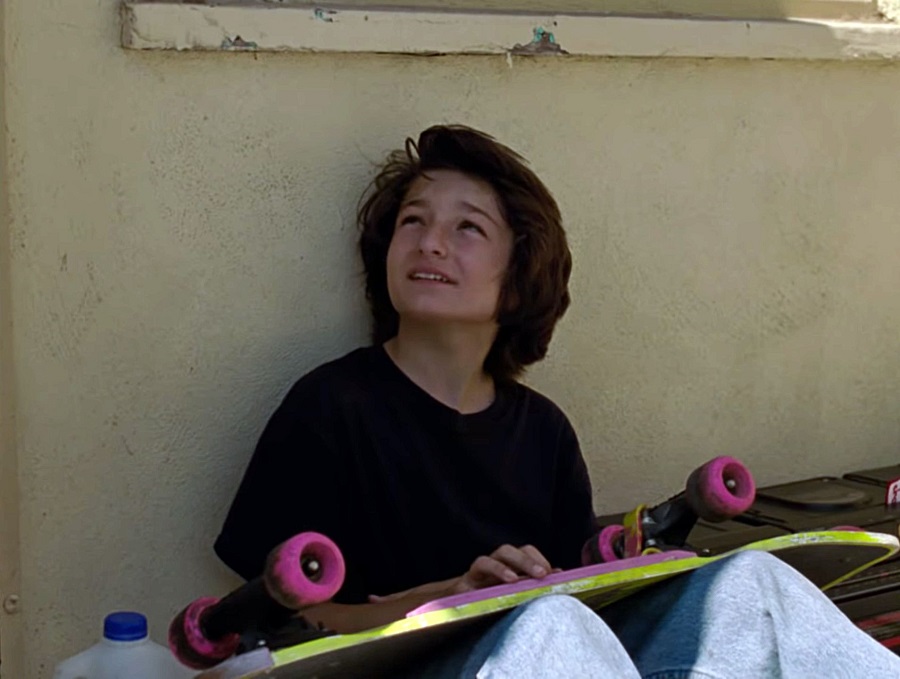
Where the film starts to suffer some major problems is in the big-picture department. The first thing we should discuss is the runtime, at a mean-and-lean 84 minutes. Normally I subscribe to the notion of less-is-more, as most films can afford to shave off several minutes of excess, but in this case I feel the film would have benefited from another 10-15 minutes of character and plot development. It seems to be A24’s M.O. as a production company, keeping these films short and sweet to keep costs low, as we saw in the equally-short Lady Bird and Eighth Grade. I wonder if they strong-armed Hill into trimming more fat than he wanted, since he’s mentioned in interviews that he had to make some hard cuts to reach the final version. For a film like this in particular, where most of its charm comes from simply hanging out with the crew and enjoying their company, I would have liked to spend a little more time in that world to feel my money (and time) were well-spent.
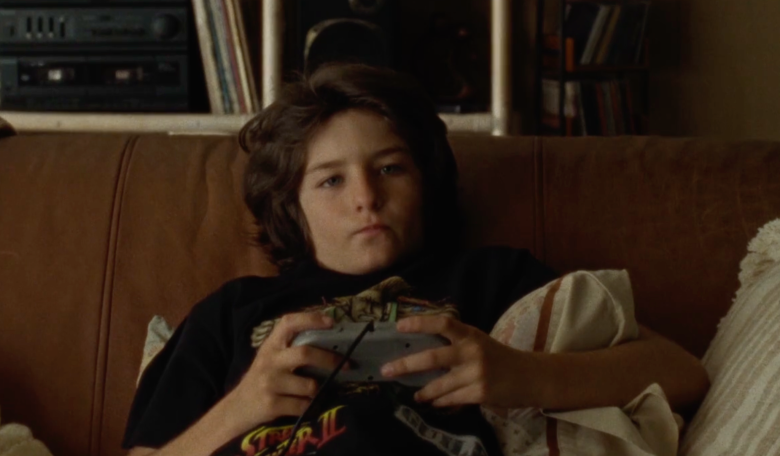
The most notable area of the film that suffers as a result is the ending. As many critics and fans have already pointed out, the film ends on a very abrupt note, in the immediate aftermath of the car crash and Stevie waking up in the hospital. I do feel that the film reached its necessary emotional conclusion in this scene, mostly through nonverbal cues between characters, but it could have used an extra scene or two to truly feel complete. The logic of this final scene is also sketchy: not only does Fuckshit get off scot-free for crashing a car while drunk, but Stevie’s mother seems too easily forgiving of these kids for endangering her son’s life. I get the emotional logic of her realization that they have Stevie’s back no matter what, but again, it’s likely the compressed nature of the finale that leaves me feeling conflicted about it.
Speaking of which, Stevie’s mother feels like the least developed character of the bunch, and if I had to guess, is the biggest victim of runtime-trimming. I thought she could have used an extra scene or two for us to understand her properly. It’s never really clear how good of a mother she is: the only time we see her outside of the context of the skate crew is when she discusses a man she’s been sleeping with. It’s clear that Stevie is rebelling against something in his home life, whether it’s predominantly his brother’s doing or not, but it felt mostly glossed over. Obviously this isn’t an autobiography, and I have no idea what Hill’s relationship with his parents was like, but I did not come away from Mid90s feeling like I had a firm grasp on how Stevie perceived his mother, which could have benefitted the film greatly.
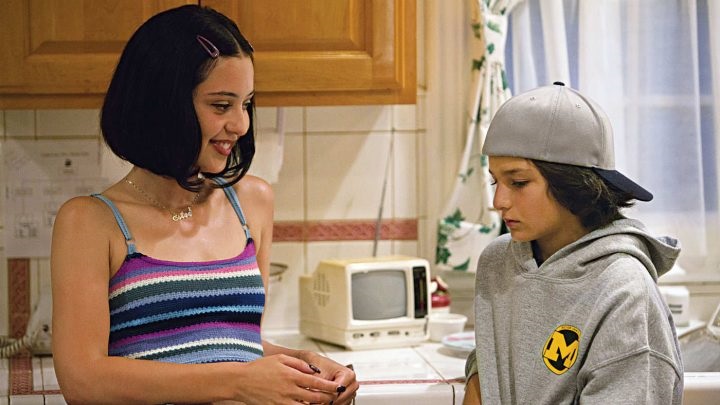
Although the film intentionally deals with tough topics like underage drinking, smoking, and sex, I fear that Hill minimized these phenomena a bit too much. There’s a highly-uncomfortable sex scene that borders on either child pornography or pedophilia, which could have been better served cutting before we actually see anything happen. Stevie’s descent into the world of boozing and toking feels a little too “easy,” in that he flips a switch from 0-100 real quick between totally green and experienced drinker. This is an area where Hill could have killed two birds with one stone, if he’d used this as an opportunity to develop more conflict with Stevie’s mother. But if it was his intent to focus on the relationship with the brother moreso than the mother, that’s his prerogative. Overall it seems Hill teases the idea that Stevie is going down a dark path, but fails to build up the tension at an even pace. Again, this could be a result of abbreviated runtime, but I can’t be sure.
To end the review on a more positive note: one of my bigger concerns going in was that the film would be overloaded with nostalgia porn and use the time period as a crutch. This is thankfully not the case, as it is a story that is amplified by the era but not defined by it, and could reasonably function in the present-day as well. The title itself, Mid90s, is almost a clever subterfuge in that regard, a wink from Hill that he’s aware of the risks he’s getting into and sidestepping effortlessly. I also like that the title plays into the ending, as Fourth Grade shows off his latest skate compilation with that name, allowing us to leave the theater on an uplifting note remembering the good times between the crew before all the drama. There’s also a transience implied by the title: the mid-90’s is an oddly-specific time window that didn’t last long, just as these characters’ time together won’t last long but will have meaningful long-lasting impacts on their lives. Although I disliked the title at first, after seeing the film and letting it sit with me, it is an oddly perfect match.
Conclusion
Mid90s is basically this year’s Three Billboards: it’s a movie that I loved in the moment, but the more I think about and deconstruct it, the more I find issues with it. I want to give this a grade in the A range, but I can’t in good conscience with so many things holding it back from perfection. This is a case where the rating does not fully reflect my feelings on the film, because despite its imperfections as a craft, it was one of my favorite film experiences of the year. Terrific acting and chemistry, specifically from the young actors, made this a wonderful coming-of-age story that (in my opinion) surpasses past genre hits like Lady Bird and The Edge of Seventeen. Considering that this is a directorial debut and there is a ton of promise hidden among the mistakes, I am eager to see what Jonah Hill comes up with for his next project behind the camera. You should absolutely go see it.
VERDICT: B+
All image rights belong to A24.
October is finally winding down, and it’s been a doozy for film releases! Next month has a few more heavy-hitters heading deeper into awards season, from Widows to The Ballad of Buster Scruggs to The Favourite to If Beale Street Could Talk. Expect reviews on all of those and more in the coming weeks, and check out the home page for more reviews and script analyses! Thanks for reading.
-Austin Daniel
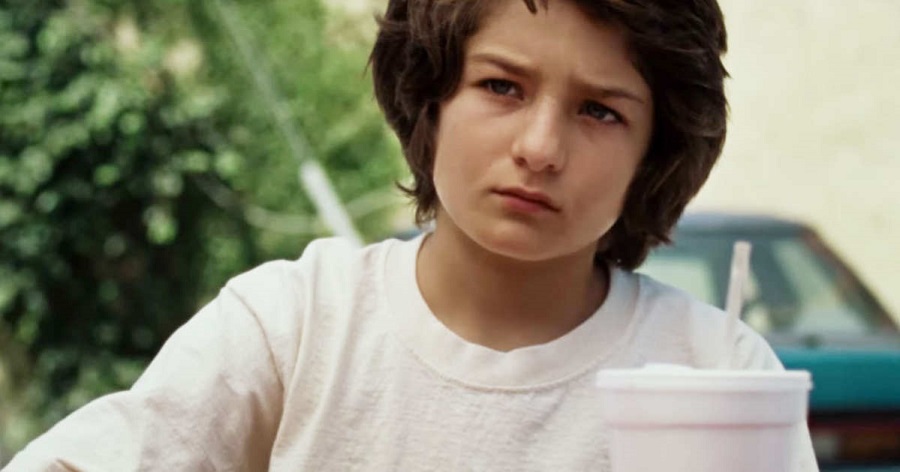
Hey there. Nice review. I do think the film’s verite style works including the non development of characters and Stevie’s quick dive into the party life. I dug the observational commentary on how life unfolds in the world of video games, absentee single parents and teenage angst. One thing in the ending that nobody seems to be pointing out. That something much worse may have happened to Stevie. (Don’t want to spoil anything)
LikeLike